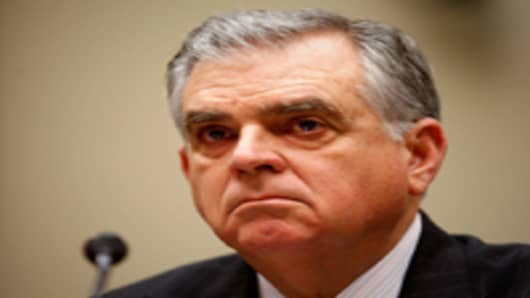Taken together, the proposals, which are expected to take effect in the fall, are the Obama administration’s answer to rising frustrations about airline delays, proliferating fees, shady advertising practices and the general lack of responsiveness by carriers to customer complaints. Legislation to deal with some of these issues remains stalled in Congress, and previous administrations generally relied on the airlines to address these problems themselves.
“All of these rules come about as a result of complaints that we’ve heard from the flying public,” Ray LaHood, the transportation secretary, said at a news briefing. “These are the things that people get irritated about.”
The tarmac rules, which took effect in late April, require airlines to give passengers stuck on the tarmac the option to get off the plane after three hours, with exceptions for safety and security reasons. Carriers were also required to develop plans to deal with lengthy tarmac delays and provide passengers with snacks, water and working bathrooms.
The new proposals expand the number of airlines required to adopt tarmac delay contingency plans to include foreign carriers, which would also have to begin filing data with the Transportation Department about tarmac delays.
The reporting provision would be extended to any carrier operating any aircraft with 30 or more seats, including regional airlines. Currently the rule applies only to the largest airlines in the United States.
Both American and foreign airlines would be required to include these contingency plans in their contracts of carriage — the lengthy legal document governing any ticket purchase — a provision the passenger advocacy group FlyersRights.org asked the department to adopt.
“That gives more notification to the passenger,” said Kate Hanni, founder of FlyersRights. “It also adds a layer of enforceability.”
Ms. Hanni said raising the compensation for passengers denied boarding was another provision she had requested. In her view, it is the most important provision in the proposed new rules, based on the number of complaints her organization has received about this issue.
The minimum compensation would be increased more than 50 percent, to $650 to $1,300, depending on the destination and the length of the delay. The new amounts would be automatically adjusted to account for inflation every two years.
The compensation for bumped passengers was raised two years ago for the first time in two decades, but by an amount that fell short of the cost of the inconvenience many experienced.
The rules would require airlines to offer compensation to passengers who were bumped from their scheduled flights and were traveling on frequent-flier awards (not just those who paid for their tickets). The airlines would also have to inform bumped passengers that they can choose monetary compensation in lieu of the travel vouchers that airlines often offer as an alternative to cash.
These vouchers typically have restrictions on how and when they can be used, potentially making them as difficult to redeem as frequent-flier awards. The new rule would require carriers to clearly outline any such limitations when they offer vouchers.
In response to the proposed rules, the Air Transport Association of America, an airline trade group, issued a statement that said: “The A.T.A. member airlines’ shared goal is to provide a safe, efficient, reliable and economically viable air transportation system consistent with the expectations of their customers, employees and shareholders. Today’s D.O.T. notice of proposed rule-making will be evaluated against that standard, with a focus on minimizing potential passenger inconvenience.”
Representatives from individual airlines declined to comment, saying they needed time to digest the 84-page document, but would be participating in the comment process. The government estimates the new rules would cost the airlines $26 million over 10 years, though these figures are difficult to quantify.
All the proposals announced Wednesday are subject to a 60-day public comment period, and Mr. LaHood encouraged “common, ordinary citizens” to submit feedback online at Regulations.gov. The department is also working with Cornell to make it easier for travelers to comment.
As part of an effort to increase participation in agency rule-making, Cornell’s RegulationRoom.org Web site lets travelers choose an issue and post their opinions.
One topic the department is soliciting feedback on is dealing with passengers who have severe peanut allergies. It offered several options, including prohibiting airlines from serving peanuts or requiring carriers to create a peanut-free zone.
“What we’re really trying to do is lower the barriers to participation,” said Cynthia Farina, a professor at Cornell Law School who is working on the university’s rule-making initiative for the Web.
Speaking last month at the first meeting of the Future of Aviation Advisory Committee at the Transportation Department’s headquarters in Washington, Mr. LaHood acknowledged his own frustration with the government’s rule-making procedures.
“We’re as frustrated as you all are about rule-making,” he said. “It’s a torturous process.”


